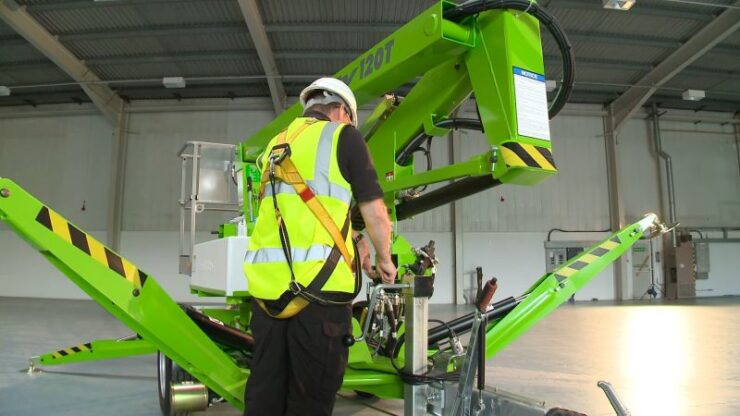Operating a cherry picker requires some preparation. Whether you’re working on a construction site, handling repairs, or even helping with events, knowing the requirements is essential.
Cherry pickers can be both powerful and practical, yet they require a certain level of knowledge and compliance to operate safely and legally.
Are you wondering if a license is necessary to operate a cherry picker, what type of training might be required, or how to get started? This article answers each question, offering a clear, straightforward look at every key point you need to know.
Key Points
- Licenses depend on region and intended use.
- Training builds essential safety knowledge.
- Some cherry pickers require certifications.
- Following guidelines ensures safe operations.
- Always verify regional and local regulations.
License Requirements: Is It a Must?

Operating a cherry picker can be straightforward, but requirements vary. License requirements in the UK depend on the use and workplace requirements.
Workplace safety protocols insist on these measures to reduce accidents and maintain order. Even though it might sound restrictive, training protects everyone involved.
In many cases, an operator’s license isn’t just a legal formality; it demonstrates competence in handling the equipment, boosting both personal and public safety.
Types of Licenses and Certifications
The type of license needed depends on the cherry picker model and the specific tasks. High-rise models or those used for specialized tasks often need certifications proving advanced skills.
Lower-level models might not need formal licenses but still benefit from operator training. Certification bodies, such as the International Powered Access Federation (IPAF) and others, offer training for various equipment types.
- IPAF Certification: Known globally, IPAF certification is widely accepted and covers different types of aerial lifts, including cherry pickers.
- Occupational Health and Safety Standards: Regions with stringent safety protocols may require operators to complete occupational safety courses.
- Employer-Provided Training: Some employers offer in-house training that meets regulatory standards, which may satisfy local requirements.
Operators should always confirm the specific license or certification type their location requires.
Safety Precautions and Skills
Licenses emphasize safety because cherry pickers, when not handled well, can pose risks. Skills acquired during training go beyond maneuvering; they focus on emergency protocols, weight distribution, and avoiding common hazards.
Safety in the field isn’t only about legal requirements; it’s about making sure everyone on site remains safe.
Regular inspections, maintenance, and awareness of surrounding hazards are part of responsible operation. Simple tips, like checking weather conditions or avoiding electrical lines, enhance safety.
Personal protective equipment (PPE) can also play a crucial role in keeping operators secure.
Can You Operate Without Formal Licensing?

Some countries or work environments may not demand licenses for basic cherry picker models. Yet, even in such cases, employers might set their own standards for safe operations.
Some cherry pickers, especially smaller models used in non-industrial settings, don’t legally require licenses.
However, even if licenses aren’t mandatory, training often still is. Many insurers require proof of training to cover liability claims in case of accidents, meaning unlicensed operations might lack essential coverage.
Training Programs: Building Essential Knowledge
Training isn’t just about legal requirements; it builds confidence and competence. Through structured training, operators learn key principles that prevent mishaps. Common training topics include emergency responses, equipment handling, and weather assessments.
- Basic Operational Skills: Maneuvering controls and adjusting heights.
- Risk Awareness: Avoiding common dangers such as high winds or loose debris.
- Emergency Protocols: Steps to take if the cherry picker malfunctions.
Experienced trainers can prepare operators for both common and rare challenges they might face.
Regional Differences in License Requirements
In some places, a cherry picker might require an extensive licensing process, while in others, little is required beyond safety training. The difference often comes down to specific state or local regulations.
For example, US operators often find that different states have varying policies on cherry picker operations.
Each operator should check their local guidelines before beginning work. Regulations in the EU, for instance, tend to be strict on high-risk equipment, while other regions may focus more on commercial and insurance requirements.
Cherry Picker Insurance Requirements

Insurance can make or break a cherry picker operation. Many insurance providers insist that operators hold valid certifications, even if local regulations don’t require them. This applies to most high-risk machinery, as insurance firms want to reduce liability risks.
For cherry pickers, insurance often covers the equipment, the operator, and third parties affected by any mishaps. Operators without the necessary licenses might struggle to secure coverage, or they might face higher premiums.
Thus, licenses often offer an additional layer of security, both legally and financially.
Do Small Businesses Need Licenses?
Small businesses, especially those involved in events or small-scale construction, often wonder if they must obtain licenses. Many cherry picker models used by small businesses do not need extensive licenses but may require training as part of workplace safety measures.
Operators or business owners should verify if their intended cherry picker model qualifies for unlicensed operation. Sometimes, small business operators can seek lower-cost certifications that meet minimum standards without the full licensing process.
Tips for Choosing the Right License and Training
If you’re unsure about what license or certification you might need, follow these tips:
- Identify Your Cherry Picker Type: Each model has different training needs, and requirements often depend on the equipment’s size.
- Check Employer Policies: Some employers have additional requirements.
- Review Local and National Standards: Regulations vary by region; consult local guidelines to avoid surprises.
- Ask for Expert Advice: Providers of cherry picker training and certification often offer consultations.
Final Thoughts
Operating a cherry picker can open doors to a range of projects and opportunities, but with every benefit comes responsibility. By ensuring compliance with license requirements and seeking training, operators improve not only their legal standing but also their skill level.
Cherry pickers may look simple, but understanding their safety protocols can make all the difference.
With these insights, cherry picker enthusiasts can approach their work with both confidence and competence. A safe, informed approach to operation reflects not just professionalism but respect for everyone on site.

